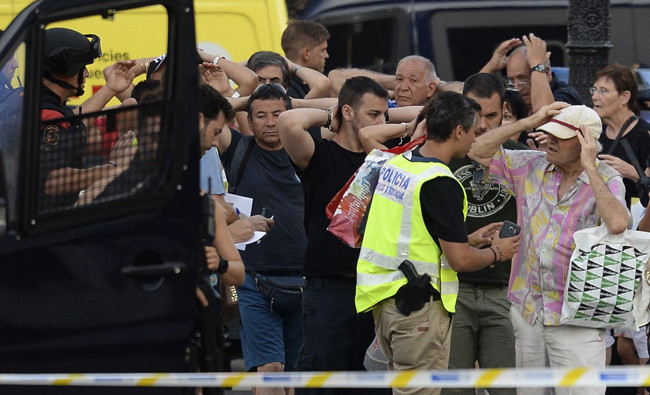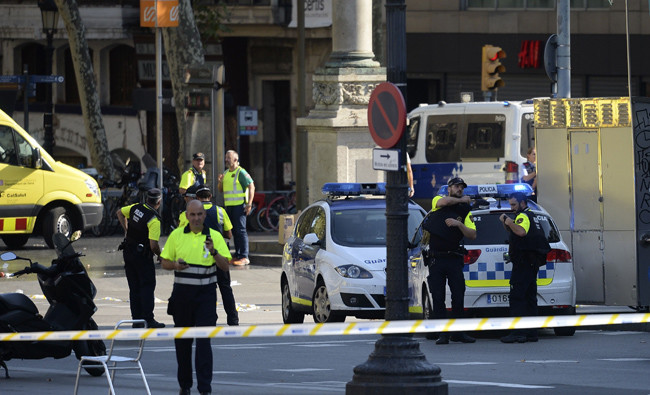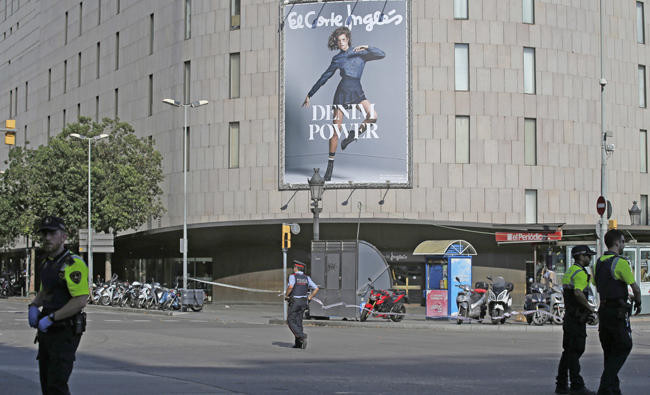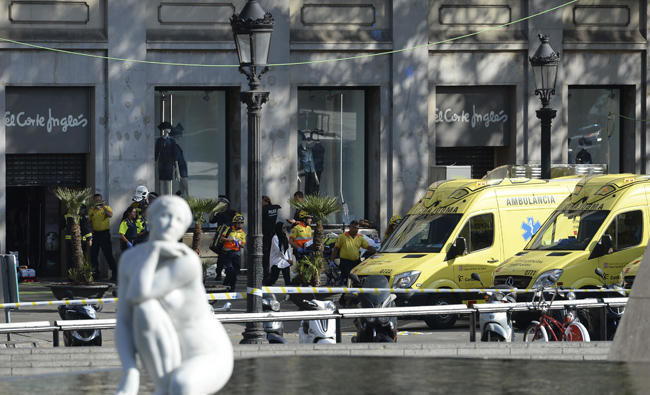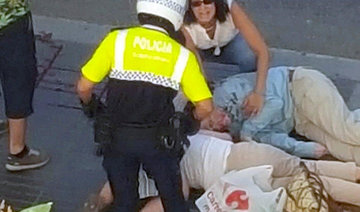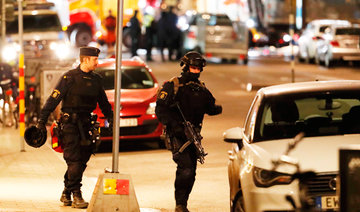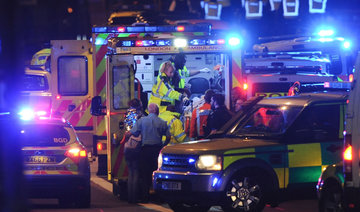BARCELONA, Spain: A van plowed into a packed summer crowd Thursday in Barcelona’s historic Las Ramblas district, killing at least 13 people and injuring about 80 others, authorities said.
"We can confirm there are 13 dead and more than 50 injured," regional interior minister Joaquim Forn tweeted.
Daesh (Arabic acronym of Islamic State) claimed responsibility in the van attack, the group's propaganda outlet Amaq said.
“The executors of the Barcelona attack were soldiers of the Islamic State,” Amaq said on its Telegram messenger account, without naming those it claimed were behind the attack.
Amaq said Daesh had launched the attack in response to calls to target states taking part in the United States-led coalition battling the jihadist group in Iraq and Syria.
Police said one suspect was killed in a shootout on the outskirts of the city, and that they had arrested two suspects, one a Spaniard and the other a Moroccan. They did not identify them or describe their roles. Earlier police were searching for the van’s driver who, according to local media, fled the scene on foot.
It was not immediately clear how many attackers were involved in the incident.
Catalan police said on Twitter that a driver ran over two police officers at a checkpoint in Barcelona following the van attack and at least one policeman was injured.
Witnesses said the van zigzagged down one of Barcelona’s busiest tourist avenues, Las Ramblas, mowing down pedestrians and leaving bodies strewn across the ground.
A second van linked to the attack has been found in the small town of Vic in Catalonia, local authorities there said on Twitter.
Spanish media earlier reported that a second van had been rented as a getaway car by attackers.
Police, meanwhile, denied reports that two armed men were holed up in a bar in Barcelona’s city center. Some media reports said hostages have been taken.
'Jampacked with tourists'
Police in Spain’s second-largest city told crowds fleeing the scene by megaphone that they were dealing with a “terrorist attack.”
Xavi Perez, who works in a sports shop near the site of the attack, described a scene of carnage.
"When it happened I ran out and saw the damage," he said. "There were bodies on the floor with people crowding round them. People were crying. There were lots of foreigners."
Witness Aamer Anwar told Britain's Sky News television that he was walking down Las Ramblas, which he described as "jam-packed" with tourists.
"All of a sudden, I just sort of heard a crashing noise and the whole street just started to run, screaming. I saw a woman right next to me screaming for her kids.
"Police were very, very quickly there, police officers with guns, batons, everywhere. Then the whole street started getting pushed back."
Barcelona resident Keith Fleming said he was watching television in his building on a side street just off Las Ramblas when he heard a noise and went out to the balcony to investigate. He said he saw "women and children just running and they looked terrified." Fleming heard a bang, possibly from someone rolling down a store shutter, as more people raced by. The American living in the Spanish city said police arrived and pushed everyone a full block down the street. He said the officers still are there with guns drawn and riot police stationed at the end of the block. His street now is deserted. "It's just kind of a tense situation...."Clearly, people were scared," he said.
The famous Las Ramblas boulevard is one of Barcelona’s busiest streets, normally thronged with tourists and street performers until well into the night.
Now a battered city
Spain has so far been spared the kind of extremist violence that has occurred in nearby France, Belgium and Germany.
But it was hit by what is still Europe’s deadliest jihadist attack in March 2004, when bombs exploded on commuter trains in Madrid, killing 191 people in an attack claimed by Al Qaeda-inspired extremists.
Live scenes from #Barcelona terror attack .
pic.twitter.com/6lH6QPW16C— KashmiriPandits News (@kpnewschannel) August 17, 2017
Vehicles have been used in several terror attacks in Europe in recent years, including a jihadist massacre that claimed 86 lives in the French Riviera city of Nice.
That onslaught in July last year and other similar attacks were claimed by the Islamic State jihadist group.
In July 2015, a hooded attacker opened fire outside a hotel in downtown Barcelona near Las Ramblas, leaving two people injured, police said.
One person was struck by bullets while the other was hurt as they tried to flee the shooter, who fled the scene. No suspected motive for the attack was given.
Spain has emerged as a potential target for jihadists, with extremist websites mentioning it for historical reasons, since much of its territory was once under Muslim rule.
Generally, authorities in Spain — the world’s third largest tourism destination — remain discreet on the terror threat.
But they publicize every arrest of alleged jihadists, most of them detained for propaganda, recruitment for extremist groups or “glorifying terrorism.”
According to the interior ministry, more than 180 “jihadist terrorists” have been arrested since June 2015 when Spain raised the terror alert level to four out of a maximum of five, in domestic and foreign operations.
This is today's reality in Europe. Extremely graphic. #Barcelona #LasRamblas #Spain pic.twitter.com/XPaTKw9C1J
— Voice of Europe (@V_of_Europe) August 17, 2017
Cars, trucks and vans have been the weapon of choice in multiple extremist attacks in Europe in the last year.
The most deadly was the driver of a tractor-trailer who targeted Bastille Day revelers in the southern French city of Nice in July 2016, killing 86 people. In December 2016, 12 people died after a driver used a hijacked trick to drive into a Christmas market in Berlin.
There have been multiple attacks this year in London, where a a man in a rented SUV plowed into pedestrians on Westminster Bridge, killing four people before he ran onto the grounds of Parliament and stabbed an unarmed police officer to death in March and four men drove onto the sidewalk of London Bridge and rampaged with knives nearby, killing eight in June.
A man also drove into pedestrians leaving a London mosque later in June.


